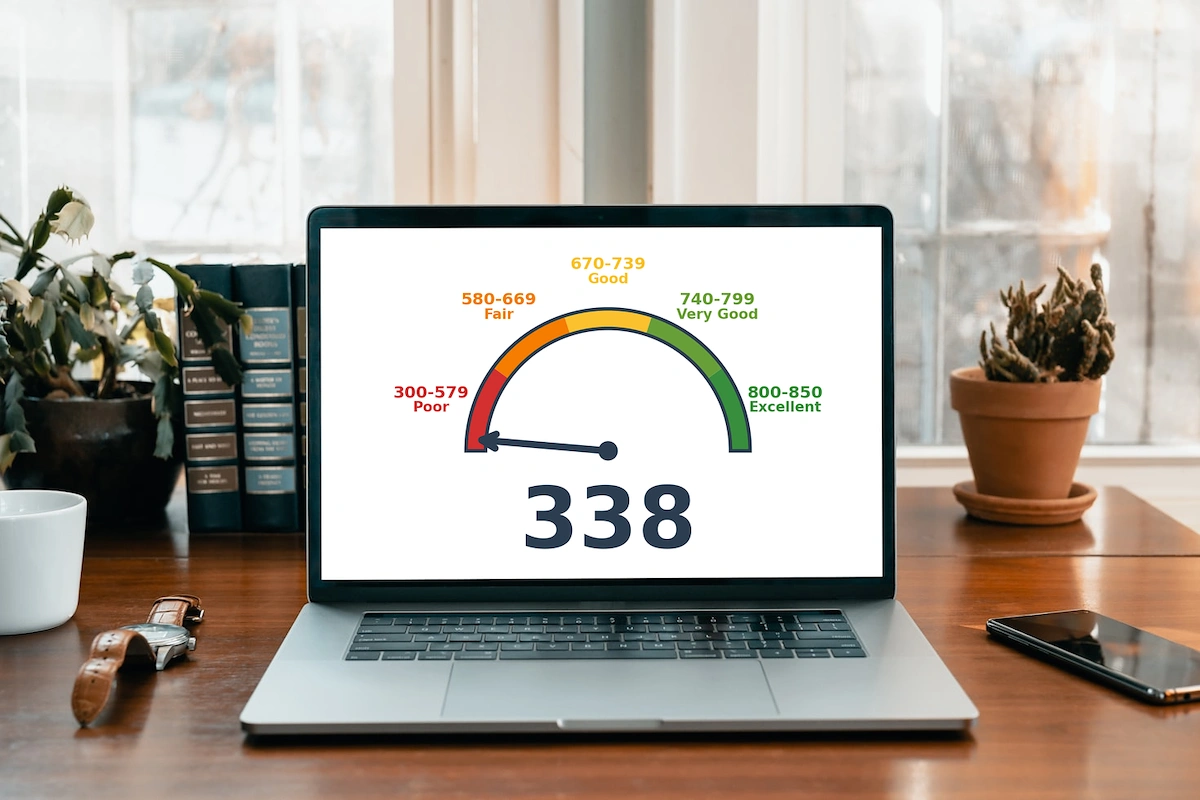
Kudos has partnered with CardRatings and Red Ventures for our coverage of credit card products. Kudos, CardRatings, and Red Ventures may receive a commission from card issuers. Kudos may receive commission from card issuers. Some of the card offers that appear on Kudos are from advertisers and may impact how and where card products appear on the site. Kudos tries to include as many card companies and offers as we are aware of, including offers from issuers that don't pay us, but we may not cover all card companies or all available card offers. You don't have to use our links, but we're grateful when you do!
338 Credit score: What You Need to Know in 2025
July 1, 2025


TL;DR
A 338 credit score is a starting point that presents a clear opportunity for building a stronger financial profile. This score falls into the 'Poor' FICO score category, establishing a baseline from which you can begin to improve your credit standing.
What Does a 338 Credit Score Mean?
A credit score of 338 places you in the "poor" category on the FICO Score range of 300 to 850, signaling to lenders that you are a high-risk borrower. You'll likely face significant hurdles when applying for a mortgage, auto loan, or credit card. Any approved credit will almost certainly come with steep interest rates and unfavorable terms, making borrowing much more expensive.
While a 338 score creates considerable financial challenges, it isn't permanent. This score reflects past credit behavior, but it doesn't have to define your future. Recognizing your current standing is the crucial first step toward building a stronger credit history. Over time, demonstrating more reliable borrowing habits can gradually improve how lenders view your creditworthiness and open up new financial opportunities.
Who Has a 338 Credit Score?
While age itself isn't a factor in credit score calculations, there is a strong correlation between age and average credit scores. Data from Experian shows that scores tend to improve as people get older, largely because they have had more time to build a positive payment history. Here is the breakdown by generation for 2023:
- Generation Z (ages 18-26): 680
- Millennials (ages 27-42): 690
- Generation X (ages 43-58): 709
- Baby Boomers (ages 59-77): 745
- Silent Generation (ages 78+): 760
Credit Cards With a 338 Credit Score
A credit score of 338 falls into the "very poor" range, which can significantly hinder your ability to obtain a credit card. Lenders view this score as a high-risk indicator, making them hesitant to approve applications for traditional, unsecured credit cards. Consequently, your options will likely be restricted to secured credit cards or subprime cards that come with higher interest rates and lower credit limits.
Kudos can help you find suitable options with its AI-powered tools that sort through a database of nearly 3,000 cards. Based on your unique financial situation and preferences, these tools provide personalized recommendations and insights into how a new card might affect your credit.
Auto Loans and a 338 Credit Score
A 338 credit score places you in the deep subprime category, making an auto loan challenging to secure and likely to come with very high interest rates. For context, a 2025 market analysis shows the vast difference in average rates across credit score brackets:
- Super-prime (781-850): 5.25% for new cars and 7.13% for used cars.
- Prime (661-780): 6.87% for new cars and 9.36% for used cars.
- Non-prime (601-660): 9.83% for new cars and 13.92% for used cars.
- Subprime (501-600): 13.18% for new cars and 18.86% for used cars.
- Deep subprime (300-500): 15.77% for new cars and 21.55% for used cars.
Mortgages at a 338 Credit Score
With a 338 credit score, qualifying for a traditional mortgage is highly unlikely. Most lenders have minimum score requirements that are significantly higher. For instance, government-backed FHA loans require a score of at least 500, while conventional loans usually start at a 620 minimum. According to mortgage requirements, very few borrowers secure loans with scores below 600, making it wise to focus on credit improvement before applying.
Even if you found a rare specialty lender willing to consider your application, a low score would lead to unfavorable terms. You would face much higher interest rates, larger down payment requirements, and limited borrowing amounts. Lenders would also subject your entire financial profile to a stricter review process known as manual underwriting to compensate for the risk.
What's in a Credit Score?
Understanding your credit score can feel like trying to solve a complex puzzle, as it's a blend of several key financial habits. The most common factors that determine your score include:
- Your payment history tracks whether you have paid past credit accounts on time.
- Credit utilization is the percentage of your available credit that you are currently using.
- The length of your credit history considers the age of your oldest account and the average age of all your accounts.
- Credit mix refers to the variety of credit products you have, such as credit cards, retail accounts, and loans.
- New credit inquiries and recently opened accounts can also temporarily impact your score.
How to Improve Your 338 Credit Score
Your credit score plays a crucial role in your financial life, but a low score doesn't have to be permanent. With consistent effort over time, it is possible to improve your creditworthiness using proven methods and see meaningful changes.
- Monitor your credit reports regularly. This allows you to identify and dispute any inaccuracies or signs of identity theft that could be unfairly damaging your score. For a very low score, ensuring the reported information is correct is a critical first step toward rebuilding.
- Establish automatic bill payments. Since payment history is the most significant factor in your score, paying bills on time is non-negotiable. Automating payments prevents late fees and negative marks, which is essential for stopping a low score from falling further and starting to build a positive history.
- Reduce your credit utilization ratio. This ratio measures how much of your available credit you're using, and a high ratio can significantly lower your score. Paying down balances to get below the recommended 30% threshold demonstrates responsible credit management to lenders.
- Apply for a secured credit card. For those with damaged credit, a secured card is a powerful tool for establishing a positive payment history. Because it requires a cash deposit, it's easier to get approved for, and your payments are reported to the credit bureaus to help you rebuild.
Kudos offers a free AI-powered browser extension and other resources to help you manage your credit cards and improve your financial health.

Supercharge Your Credit Cards
Experience smarter spending with Kudos and unlock more from your credit cards. Earn $20.00 when you sign up for Kudos with "GET20" and make an eligible Kudos Boost purchase.
Editorial Disclosure: Opinions expressed here are those of Kudos alone, not those of any bank, credit card issuer, hotel, airline, or other entity. This content has not been reviewed, approved or otherwise endorsed by any of the entities included within the post.




























.webp)
.webp)
.webp)
.webp)
.webp)

.webp)
.webp)
%20(1).webp)
.webp)